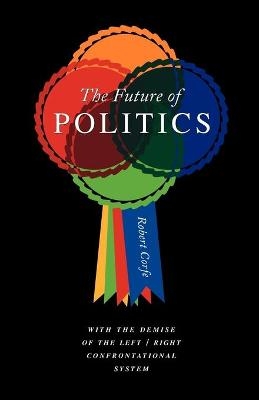
The Future of Politics
Arena Books (Verlag)
978-1-906791-46-9 (ISBN)
The left/right confrontational system is coming to an end, since it is failing to further promote the interests of majorities worldwide. For 200 years it has acted as the linchpin of democracy, and politics is almost unthinkable without referring to the concepts of the Left or the Right. This book describes how the old confrontational system has fulfilled a vital function for the progress of humanity, but how in advanced industrial economies everywhere, it is now reaching the end of its useful purpose. This is not only reflected in the collapse of party memberships globally, but in the tendency of legislation and the executive to compound rather than resolve the issues of our age. Meanwhile, a new class is emerging in the advanced industrial world, which the author describes as the middle-middle 90 per cent plus majority. Because contemporary parties are trapped in a time-warp of the past, they are unable to represent the interests of this new majority. The most urgent political issue of our time - heightened by the debt-fuelled financial crisis - is the need to make the banking and corporate sectors socially responsible. This book outlines a practical strategy towards this end.
Only when that is achieved will it be possible to address effectively such pressing issues as climate change. Over the past 60 years society and the world of work have been transformed out of all recognition. Whilst the world of actuality has raced ahead, political thought has lagged behind - unable to keep apace with the significance of real events. In the light of this situation, the author points to the necessity for a fresh approach to political thought in breaking the existing mould. New and more effective democratic mechanisms are needed to ensure a socially just and equitable society for a better future. Hence the now malign left/right concepts of the past must be repudiated forever.
Robert Corfe is not only a prolific writer on political and socioeconomic topics, but is experienced in party political life both locally and on the national level. His successful journalistic career dates from the 1960s, and through extensive study, he has acquired considerable knowledge of the social sciences, history and philosophy. After a long business career in senior management in a manufacturing environment, promoting home-based productivity, and later as a management consultant, he founded the Campaign For Industry in 1987 to confront the damaging tendencies of international finance. Lord Gregson of Stockport was elected President of the association, and over a period of a decade Corfe wrote many pamphlets on the problems of industry and the question of more widely distributing the assets of wealth. His ten years in Scandinavia, in addition to business travels throughout the world, have given him a broad perspective of the needs of all humanity.
Preface V; CHAPTER 1; The futility of the left/right divide in resolving the problems of today and tomorrow; 1 - The silent death of democracy; 2 - Averting the dangers of discontent; 3 - Spin as the desperation of impotent government; 4 - Left/right politics has lost its usefulness; 5 - The unsuspected threat to the political establishment; 6 - Disillusionment of those who live in the political past; 7 - Disillusionment of the realist majority; page - 1; CHAPTER 2; The widening divide between the people and their rulers; 1 - The demise of the left/right political conflict; 2 - The great desertion from political life; 3 - Emergence of the new majority; 4 - Political status of the super-rich and underclass; 5 - Characteristics of the new majority; 6 - Their monopoly of knowledge; 7 - But hidden financial knowledge is their need and right; 8 - Why the mechanisms of the financial world should be public knowledge; page - 16; CHAPTER 3; Why political parties are no longer capable of resolving the new issues of our time; 1 - Governmental complacency in the face of affluence; 2 - The left's repudiation of business values; 3 - The inescapable essence of business activity; 4 - The dichotomy of Labour's approach to industry; 5 - How the class-based perspective depresses standards; 6 - Bye-passing the business mindset undermines the economy; 7 - Economic policies of the right have been no less disastrous; 8 - Social versus Unsocial capitalism; page - 31. CHAPTER 4; How corporations have absorbed governments worldwide and neutered democracy; 1 - People power through the nation state; 2 - Insensitivity of US internationalism; 3 - Internationalism of the left; 4 - The origins of globalisation; 5 - The debt-fuelled economy and widespread dispossession; 6 - Dispossession equals democratic disempowerment; 7 - Unsocial Wealth Creation in practice; 8 - How consumers lose out to the multiples; 9 - How corporate power homogenises taste and annihilates individuality; page - 48; CHAPTER 5; Contemporary problems no longer lend themselves to a class-based interpretation; 1 - A scientific approach and the relevance of democracy; 2 - Democracy and its need for Creative Conflict; 3 - The left/right divide was the Creative Conflict of the recent past; 4 - Alienation of the majority from established politics; 5 - Justice and equity achieved through the evolution of democracy; 6 - The end of the road for the left/right divide; 7 - How the old divide is now counter-productive; 8 - The blindness of opinion-formers and politicians to this fact; 9 - The transformation of the classes; 10 - Individualism and the burdens of responsibility; page - 64; CHAPTER 6; The political parties have sold out to usurious financial interests; 1 - The irrationalism and harm of financial markets; 2 - Reconstruction and not reform is called for; 3 - The ills of Rentier and global capitalism; 4 - Why the left refrain from challenging globalisation; 5 - Today's major issues do not lend themselves to knockabout politics; 6 - Whilst Rentier economies destroy the environment, Productive economies work for its rescue; 7 - Why today's economic issues are no longer class-based; 8 - Why the new majority disdain class-based politics; 9 - The Universal economic issues of our time; 10 - These issues are dismissed by the left as representing middle class "interests"; 11 - The left is blind to injustice against the new majority; page - 84. CHAPTER 7; The unrepresented middle-middle majority is the political and democratic hope for the future; 1 - Politics must be based on scientific realism; 2 - The middle-middle majority as the political class of the future; 3 - Why it is ideally situated in promoting full democracy and social justice; 4 - Full democracy requires that financial power be made democratically accountable; 5 - True democracy is conditional on the high educational standards of its people; page - 105; CHAPTER 8; The profitable Productive economy must displace Rentier capitalism; 1 - Democracy and individual freedom; 2 - The state should be wary of ideology and charismatic tendencies in political life; 3 - It should promote culture as the medium of communication; 4 - Current failed attempts to break the political mould; 5 - Futility of movements failing to confront the financial system; 6 - The two forms of capitalism; 7 - The greater socioeconomic success of Productive over Rentier capitalism; 8 - Britain's state of denial over her failing capitalism; 9 - Why necessity will enforce Productive capitalism on a fragile world; 10 - How the world lost faith in a benign America; 11 - Political and industrial elites are everywhere in the pocket of America; page - 115; CHAPTER 9; The knowledge-based new majority as the foundation stone for a just and equitable world; 1- Time for the new majority to bid for power; 2 - How the left/right divide and not left or right views per se frustrate political progress; 3 - Emerging new values of the middle-middle majority; 4 - A balanced perspective of working life; 5 - Egalitarianism in the knowledge-based society; 6 - The new majority enables high culture as the standard for egalitarianism; 7 - Conflicting ethical values on cultural standards; 8 - Those vested interests in suppressing standards; 9 - Vested interests of the new majority in promoting standards; page - 132. CHAPTER 10; The dialectic for the Full democracy of the future; 1 - Productive Profitability as the dialectic for democratic struggle; 2 - Full democracy achieved through the Responsible Society; 3 - An end to class war politics; 4 - Practical approach in confronting Rentier capitalism and its neo-liberal ideology; 5 - Strategy required in challenging globalisation; 6 - Collapse of home-based productivity; 7 - Restoring home-based industry through appropriate legislation; 8 - Restoring home-based agriculture; 9 - The Nationality principle essential for promoting home-based productivity; 10 - An expanding circle of international cooperation; 11 - Dissolving conglomerates but encouraging incoming investment; 12 - A federation of Social Capitalist States; 13 - A new role for the great nations of the past; page - 146; A guide to further reading 173; Index 185.
| Erscheint lt. Verlag | 1.3.2010 |
|---|---|
| Verlagsort | Bury St Edmunds |
| Sprache | englisch |
| Maße | 216 x 140 mm |
| Gewicht | 271 g |
| Themenwelt | Sozialwissenschaften ► Politik / Verwaltung ► Politische Systeme |
| Sozialwissenschaften ► Politik / Verwaltung ► Politische Theorie | |
| Wirtschaft | |
| ISBN-10 | 1-906791-46-5 / 1906791465 |
| ISBN-13 | 978-1-906791-46-9 / 9781906791469 |
| Zustand | Neuware |
| Haben Sie eine Frage zum Produkt? |
aus dem Bereich


